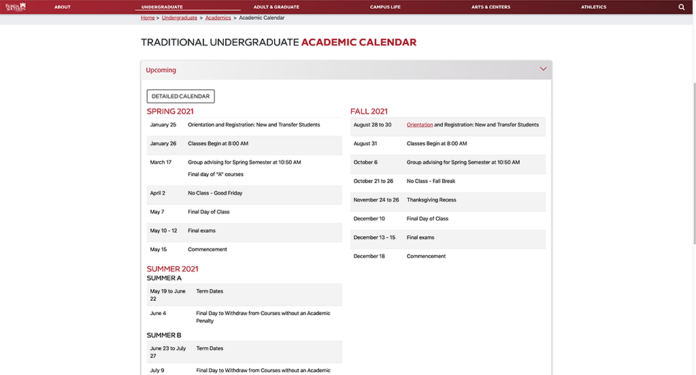
Nathalie Moreno
Florida Southern College’s administration reinstated fall break for the upcoming semester due to student mental health concerns.
Because of concerns regarding the coronavirus pandemic, FSC students did not have a spring break this fall. Instead, the college granted students a single day off, termed “FLW Day Off,” which will now become an annual tradition.
However, FLW Day Off was not enough to alleviate the toll that this semester has had on students and everyone else on campus.
Sophomore Kayla Whisenant thinks that the lack of a spring break has definitely made the semester harder to get through. Though there was a small break, on top of everything else she had to do, one day only did not help rejuvenate her mind.
“The one day [off] was not enough. I spent most of the day doing homework, so I didn’t get much time to relax,” Whisenant said.
With mental health being a big recent nationwide focus, FSC’s Counseling Center stresses the importance of having some semblance of a break from work and school. The center’s Assistant Director Joshua L. Matthews claims research shows that having occasional breaks from our occupations helps people actually improve and perform better when they return from said break. People are more productive and overall more satisfied; not taking breaks at all will result in the opposite effect.
“The lack of [academic/work] breaks has been shown to have many negative effects,” Matthews said. “Whether or not we have a week [or so] off of work/school we as people need to take better care of ourselves and others. We all could benefit from investing more in ourselves through self-care, taking regular breaks and being more aware of our needs.”
With the return of a regular fall break, students will benefit both emotionally and physically.
“Physical improvements associated with breaks/vacation are decreased in blood pressure, decreased likelihood of heart disease/heart attack, and a decrease in cortisol (stress hormone),” Matthews said. “Mental health benefits [include reduced] stress, depression, and anxiety.”
The college’s administration is also aware that having to go through school during a pandemic is tougher than usual. Dr. Brad Hollingshead, FSC Provost and Vice President of Academic Affairs, along with the rest of the administration took these concerns into account when planning for next semester.
“We have reinstated a modified fall break for 2021 in order to provide students with an opportunity to recharge after midterms,” Hollingshead said. “That is a major purpose of all breaks that are offered throughout an academic year, and we believe that our pandemic operations have thrown into relief the importance of such opportunities.”
Students had begun reaching out to the higher-ups of FSC, expressing their feelings of exhaustion and burnout from trying to constantly work through a semester straight without any kind of break. These reports were another reason why the administration prioritized a fall break that would support the students and faculty and encourage everyone to keep going.
“The break, we believe, can positively impact engagement and restore the rhythm that supports intense levels of study,” Hollingshead said.
Though the plan remains to have a modified fall break next semester, these plans are subject to change depending on the status of the pandemic and advice from infectious disease experts.
“Plans for the 2021 – 2022 academic year are being made based on current conditions and our best understanding of how the current response to the pandemic will impact conditions by fall 2021,” Hollingshead said. “Should conditions or the current projections of infectious disease experts change, then the College will adapt and make changes as necessary, which may include eliminating the fall break.”







